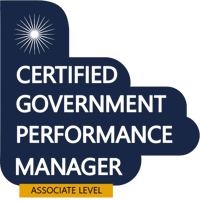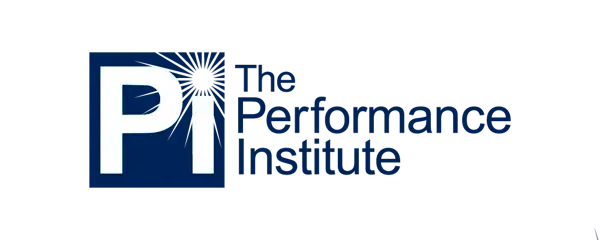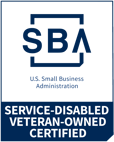
2024 Government Performance Manager Certification
About CGPM-Associate
The Performance Institute is pleased to present in-person training for our Associate-level certification, the first of three levels in our Certified Government Performance Manager (CGPM) program. Build the foundation for performance measurement and management in your organization. With the Associate Certified Government Performance Manager (A-CGPM) program, you will acquire the skills and tools needed to make you the lead performance management resource for your organization.
What to Expect
Expert-led sessions
Expert-led sessions on strategic planning, use of the Logic Model, and developing performance measures.
Key Takeaways
Takeaways and resources to apply in your work and agency.
Networking
Networking opportunities with fellow local government leaders and subject matter experts.
Insights
Insights from industry leaders with experience in implementing successful strategic plans aligning with Agency Priority Goals (APGs).
What attendees say
The course, live online, was very helpful. It contained a wide mixture of lecture, discussion, and exercises to engage the class in an effective manner. I feel that I walked away with a solid understanding of the basics in tying strategy.
The course, live online, was very helpful. It contained a wide mixture of lecture, discussion, and exercises to engage the class in an effective manner. I feel that I walked away with a solid understanding of the basics in tying strategy.
The course, live online, was very helpful. It contained a wide mixture of lecture, discussion, and exercises to engage the class in an effective manner. I feel that I walked away with a solid understanding of the basics in tying strategy.
The course, live online, was very helpful. It contained a wide mixture of lecture, discussion, and exercises to engage the class in an effective manner. I feel that I walked away with a solid understanding of the basics in tying strategy.
Topics
Day 1
Strategic Planning
Connect Strategic Planning and Organizational Results
- Discover why traditional strategic planning processes often fall short of delivering results
- Identify the characteristics and requirements of successful strategic plans, planning processes, and implementation
- Receive updates on the latest government performance mandates
Identify the Strategic Elements of
Results-Oriented Agencies
- Establish clear linkages to provide a visible chain of evidence to current agency value
- Measure the importance and relative impact of agency strategies
- Clearly communicate agency priorities and goals to all stakeholders
Design and Evaluate Strategic Framework for enhanced Goal Achievement
- Use a variety of environmental analysis techniques to analyze internal and external factors
- Solicit stakeholder input for your strategic planning process
- Identify all parties impacted by adopting new strategies and define a way to engage stakeholders
- Identify long-term goals
- Align goals to mission and customer values
- Measure the importance and relative impact of agency outcomes
Day 2
Strategic Planning
Design Outcome-Focused Strategies
- Develop results-oriented strategies and objectives to achieve outcomes
- Identify effective, efficient strategies aligned to achieve outcomes
- Create intermediate outcomes for tracking near-term progress
Align Program Activities and Resources
- Evaluate program activities based on strategic objectives
- Allocate resources based on outcome goals
- Eliminate barriers that must be overcome to achieve outcome goals
Strategies for Improving Employee Learning
- Learn how to enhance employee satisfaction by providing learning opportunities aligned with motivation and purpose.
- Determine adaptive ways to practice continuous learning at all levels of the organization.
- Understand how to increase employee contribution aligned with performance expectations.
Day 3
The Logic Model
What is a Logic Model?
- Review and understand the concept of Logic Models
- The benefits of using Logica Models
- Identify the components of a Logic Model
- Review the various ways in which logic models can be graphically displayed
Using Logic Models
- Review the Logic Model Template
- Revisiting the way to plan using a logical chain of events.
- In the Execution phase (reading left to right), we perform activities in the opposite direction.
Using Logic Models to sell your program benefits and requirements
- Close the Gap Between Senior Leadership and Operational Manager Outcomes
- Review examples of logic models that explain the benefits of a program to stakeholders
- Using the Logic Model to identify Risks
- Logic Models identify priorities and show the ROI for your programs
A Performance Logic Model answers federal requirements
- Review the Performance Logic Model
- Show how the Performance Logic Model relates to the reporting requirements
Creating your Logic Model – Mini Workshop
- Individual work: Develop a logic model for your area
- Group Work: Present the Logic Model to the class for discussion
Day 4
Developing Performance Measures
Measuring Performance for Results
- Performance Measurement is not about Mandates, it’s about Management
- Long-term Move to Performance
- Why Measure?
- Types of Measures
- Performance Measurement is a Culture Shift
Identifying Characteristics of Effective Performance Management Systems
- Effective Performance Management Systems
- Measuring Your Performance Management System
- Checklist for Effective Performance Management System
Developing Measurable Outcomes
- Identifying End Outcomes
- Intermediate Outcomes Target
- Changes in Attitudes, Behaviors, or Conditions to Achieve End Outcomes
- Performance Measures Definition
- Developing Measures Checklist
Day 5
Developing Performance Measures
Seven Steps to Using a Performance Logic Model to identify Performance Measures
- Building a Performance Logic Model
- Separating Activities from Outputs
- The “SMART” Criteria for Performance Measures
- Performance Measure Selection Criteria
- Selecting Your Measures: The Program
Performance Assessment Window - Checklist
Evaluating your Performance Measure
- Evaluate your measures for effectiveness
- Ensure they are achieving the greatest impact on your organization
- Review the 5 W’s
- Importance of evaluating measures
Tools and Templates to help you Develop Performance Measures
- The fundamental principles for good performance measurement
- Identifying the right attributes to capture
- The tools to think through your measure development
Midtown Center
1100 15th St NW, Washington, DC 20005-
training@performanceinstitute.org
-
877-992-9521








